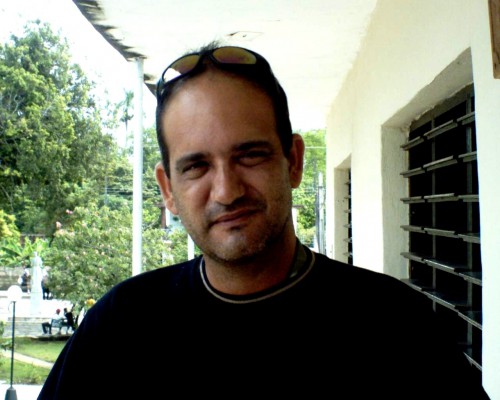Carlos Esquivel
by Sampsonia Way / August 9, 2013 / No comments
He is a writer living deep in the far-off provinces, but he is not at all a provincial writer. Indeed, he is one of those writers who have opened his prose and poetry to the cosmopolitan, which in Cuba is quite a gesture of controversial politicization.
He has published numerous poetry collections: Perros ladrándole a Dios (1999), Balada de los perros oscuros (2001), Tren de Oriente (2001), El boulevard de los Capuchinos (2003), Bala de cañón (2006), Matando a los pieles rojas (2008), Los hijos del kamikaze (2008) and Los ciclos de nadie (2013). Additionally, Esquivel has written several books of fiction: Los animales del cuerpo (2001), Una ventana al cielo (2002), La isla imposible y otras mujeres (2002), and Un lobo, una colina (2011).
Interview with Carlos Esquivel by Norge Céspedes (2013)
“Literature is intense for being dangerous and, at a higher level, while its pages emit greater intensity, the danger of possessing it will reveal a delirious slavery.”
“I care about being provocative, but my first concern is for atmosphere. I go for any contamination. That’s the point: To tolerate the challenge of any tradition and to defy that very tradition. There are still topics which I owe to myself. I have a life, or a piece of life, that is stained with, and between, words. There are still many mistakes for me to make.”
“In fact, no writer tries to write, as it is usually said, the books that he would like to read, but those which he cannot write. It’s like a challenge. I suppose that literature is, more or less, that. Sacrificing the summary of any anguish, and reading a possible course from fascination, an affectionate mask of perversion.” Read more.





